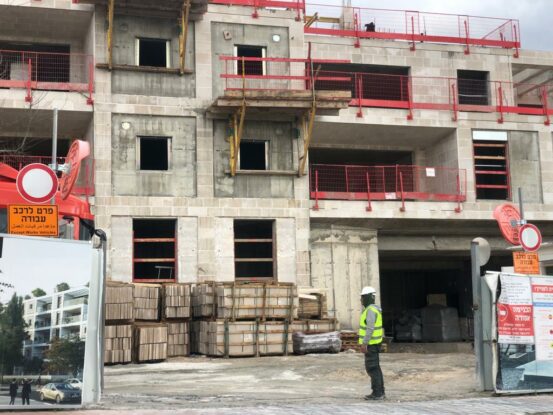The approval of the upcoming state budget includes a number of revolutionary legislative adjustments that are expected to fundamentally change the rental sector. From the construction of towers containing hundreds of small housing units for rental only, to improve the economic feasibility of their construction, and a tax reform that will curb the tax evasion that currently characterizes the rental sector. Buyitinisrael brings you everything you need to know about the legislative changes being promoted in the rental market in Israel.
After nearly a decade in which the development in Israel of the long-term rental market has steadily, but slowly, progressed, the government is now advancing a series of legislative clauses that, if fully approved, will constitute a real revolution. The legislation is promoted in the framework of the “Arrangements Law” – a wide collection of legislative amendments that are approved annually in conjunction with the approval of the state budget.
According to data from the Central Bureau of Statistics (CBS), as of 2019, about 750,000 apartments, 28% of all housing units in Israel, were used for rented accommodation. The rate reflects some increase compared to previous years, but at the same time, it is lower than the rate accepted in most western countries. In the US, for example, the percentage of rented housing units is currently 35% and in Germany, it is 48%.
The explanatory notes attached to the Arrangements Law state that, “The rental market today is not a worthy and competitive substitute for an owned apartment, in light of the disadvantages that characterize this market.” Among the notable disadvantages are uncertainty and instability, both regarding the duration of the rental, the amount of rent, and the terms of the rental. “During the rental period, and every year, the tenant is subject to the landlord’s decisions and changing circumstances in the landlord’s life, which affect the tenant’s ability to renew the contractual relationship, sometimes under new conditions. All these make it very difficult for tenants who yearn for stability, and who are afraid of the high costs of frequent relocations.”
These prevailing conditions in the rental market in Israel ultimately affect the purchase price of apartments, since tenants have a strong incentive to change their status and purchase an apartment that will guarantee stability and certainty.
Therefore, the goal of the reform in the rental market, according to the explanatory notes, is “to improve the quality of rental housing for all segments of the population, by increasing certainty and stability for tenants, easing associated costs in the rental market, correcting existing distortions, and improving housing assistance services.”
For the purpose of achieving this goal, a number of steps have been proposed. The first recommends a change in the way planning institutions currently plan the complexes intended for long-term rental. To date, there is no real difference between the way in which the rental complexes are planned and the way in which owned residential complexes are planned. This is despite the fact that it is clear to all those involved in the field that the characteristics of construction should be different.
High-density accommodation
The proposal states that “The nature of rented accommodation makes it possible to plan housing projects in a more diverse mix, which includes high density. Accordingly, it is possible to include a higher rate of small apartments intended for young couples, senior citizens, or individuals, and it is even possible to create shared zones in the building that will save space in the apartment”. Moreover, tenants of small apartments do not generally require the services of many public institutions because they are young couples and singles, thus making it possible to add more housing units without significant demands for public space.”
The amendment to the law refers to the “Planning Briefing for Rent” recently prepared by the government company “Apartment for Rent” (whose task is to promote a long-term rental market in Israel) and proposes to make its principles binding. According to the new document that will guide the planning institutions, these projects will have at least 100 apartments and at most, 500. 70% of the apartments will be small, from studios of less than 50 m² to 3-room apartments of less than 80 m², and these apartments will have one or no more than two air directions.
Unified ownership for long-term rental complexes
Another proposal included in the framework of the reform stipulates that any plan for a complex intended for long-term rental will include a binding provision for unified ownership – that is, the entire complex be held by the same entity, whether it is a real estate company, an insurance company, a REIT (real estate investment fund) or any other entity.
The purpose of this law is to streamline the management and maintenance procedures of the project, without the need to obtain consent for every move from dozens of different rights holders, as is the case in ordinary residential towers.
Increasing profitability and removing barriers
A number of additional legislative changes are intended to encourage and expand the activities of residential REITs as investment entities that will contribute to the volume of housing units intended for rent, by increasing their profitability and removing various barriers.
Currently, the law requires that real estate for rental purposes that is owned by a REIT will be populated by tenants and begin to yield within 5 years from the date of purchase. However, there are cases in which a fund purchased land intended for rental projects, but due to a delay in the issuance of building permits, which is beyond the control of the fund, it cannot yield within the 5-year period. Therefore, it is proposed to allow the REIT in exceptional cases an extension of two additional years until the project is populated.
Incentives in the periphery
One amendment proposes to allow a REIT to purchase real estate for rental purposes in the periphery containing at least 15 housing units, instead of 20, and to allow a fund to sell some of the projects in its possession after 10 years from the date of occupancy, instead of the 20 years to which it is currently obligated, to a different landlord who will continue to rent out the project until the end of the 20-year rental period.
VAT exemptions
It is also proposed to impose the value-added tax (VAT) benefits to which rental projects are entitled under the Encouragement of Capital Investments Law so that residential REITs will also be exempt from VAT on their income from either renting units or selling the projects.
Reducing tax evasion through reporting
Another significant change is expected to interest the hundreds of thousands of households in Israel that own more than one home — holding at least one apartment for investment purposes. Here the goal is not exactly to increase the rental supply, but rather to fight the many tax evasions that characterize the rental sector.
Currently, the law exempts landlords whose monthly income from rent is below a certain threshold, which currently stands at NIS 5,471, both from paying tax on this income and from reporting the income. The state is now, however, seeking to cancel the exemption from the reporting requirement, on the assumption that many landlords whose incomes are higher than the exemption ceiling are also not reporting.
Or as written in the explanatory notes to the law: “According to estimates, many homeowners enjoy the income that is not supposed to be exempt under the law, but for various reasons, they do not report it and there are collection gaps for state revenues of tens of millions of shekels.
“The imposition of a reporting requirement will make it difficult to continue tax evasion since those with income from rent will avoid making a false statement to the tax authorities regarding the amount of their income from this source.”
Another important advantage of this move is the huge amount of information that the state will receive when it is updated on all signed rental contracts, and thus be able to monitor in real-time an increase or fall in prices in the rental market in Israel – just as it does today in the purchase market. “The lack of information blinds policymakers and makes it impossible to reach decisions based on well-established data, and also harms tenants who make decisions without complete information,” the proposal states.
Importantly, it is proposed that the reporting obligation will already apply to rental income that was received in 2022.
Offsetting rent paid from rent received
Finally, an amendment has been proposed that is expected to improve the situation of landlords who rent an apartment. According to the proposal, these households will be able to offset their rent expenses from the rent income they receive, up to a maximum offset of NIS 5,700.
For example, if a property owner rents out an apartment for NIS 10,000, but himself rents an apartment for NIS 5,000, then even though his income from renting the property is well above the exemption ceiling (NIS 5,471), the property owner will still not be charged tax, since after offsetting his rental expenses, the total receipts are NIS 5,000. This represents a significant improvement from the current state, where the landlord is taxed when his rental income is above the exemption ceiling, with no ability to offset.
As you can see, the proposed amendments to the law are many and varied. At the same time, it should be remembered that at this stage they are proposals, which, if approved, will certainly be subject to changes.
It should also be noted that the previous government too published a draft of the Arrangements Law for the 2023 budget somewhere in June, which was never implemented due to the fall of the government shortly thereafter. Today, on the face of it, the coalition’s situation is more stable, but the Israeli political scene of recent years has accustomed us to always expect unforeseen scenarios. For those who currently rent an apartment, and for the housing market as a whole, the proposed legislative measures for the rental market in Israel are subject to many upgrades, and it can only be hoped that they will be implemented.
Are you interested in buying a home in Israel? Whether you are taking the first step toward a permanent move, looking for a vacation apartment or retirement residence, or making a financial investment, Buyitinisrael will help you find the property that is right for you. Drop us a line, when you’re ready to talk!







